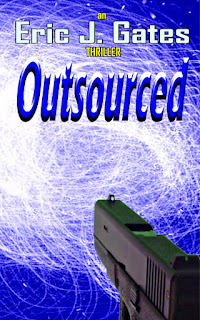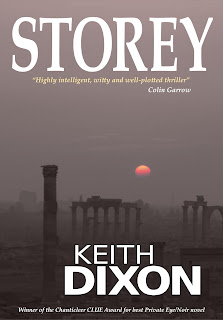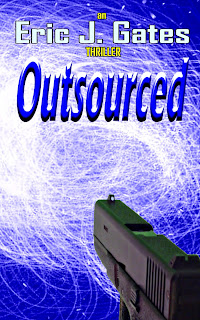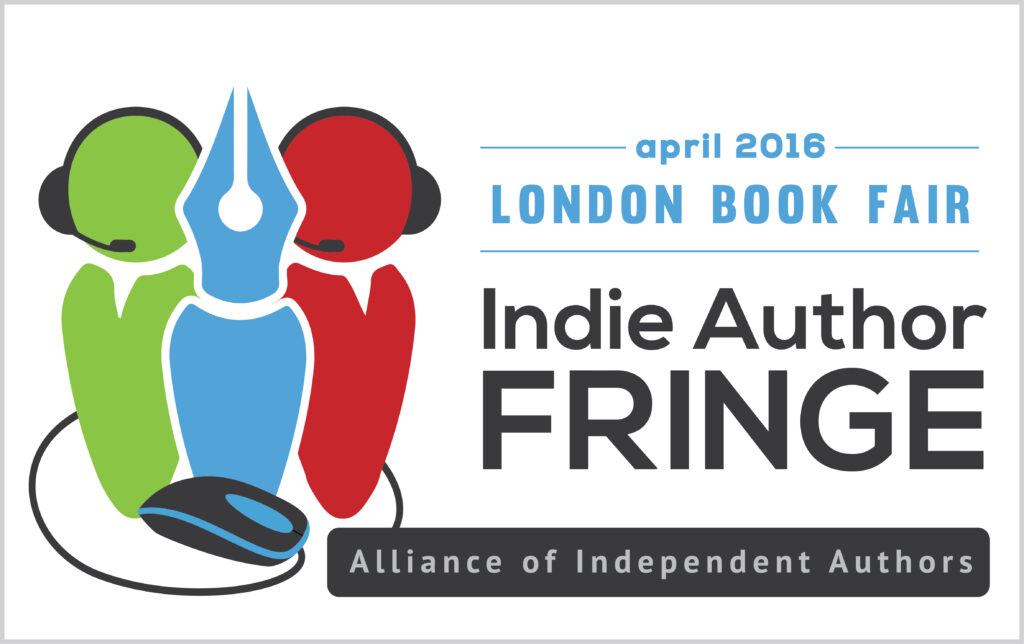You probably won't know it - yet - but the title of this blog is a clever pun based on one of the books by my guest blogger today, Eric Gates. He's the author of several thrillers which I guess deserve the prefix techno-, dealing as they do with aspects of contemporary technological life.
Eric has had an interesting and varied career (as you'll see from his bio at the end) and here he provides an equally interesting insight into how he produces his fast-paced and exciting thrillers. His blog is also very well worth a read if you're interested in thriller writing as he brings together other writers to talk about a subject of their choosing.
So, let's move on!
How do you go about beginning your novel – do you plot, or do you begin and then see where it takes you? Why do you do it that way?
My method in my madness is to start at the end. Yes, it does sound like something out of ‘Alice in Wonderland’, right? Where’s the King of Hearts when you need him? Seriously, having ‘defined’ how a story will end gives me a clear goal to work toward. Obviously, the definition of my initial ending idea is subject to change, sometimes considerably, as I write the tale, but it does allow me to create the theme and message of the novel and stay on track throughout.
Once I have an ending, the next part to be defined is the start. How is the tale going to open? Who will feature in the opening? What questions (hooks) will I pose for the reader? I confess on spending considerably more time on this (say the first three to four chapters, sometimes as many as ten given the chapters tend to be short) than on defining the ending. Not only do I seek to establish the story at the beginning of the novel, but also create a high degree of tension and emotional response (engagement) in the reader, as well as imbue these chapters with a rhythm that will draw the reader into the tale.
The rest is relatively easy (he quipped, smiling) …just propel the narrative from that bombshell opening in the direction of the ending I have in mind. Who said this writing thing was hard?
I don’t outline the novel beforehand as such, but do use Mind Mapping tools to develop ‘scenes’ which could become several chapters, as I go along. This way both the characters and the tale itself can breathe and remain fresh.
What are your thoughts on ‘style’? Is it something you’re aware of while writing? Do you focus more on the story, or on how it’s told?
I write thrillers so keep in mind the generic style constraints for this genre (tension, pace, complex characters, cliffhanger chapters, and a solid storyline) as I write. These characteristics in turn have helped me develop a very personal writing style over the course of my novels. For instance, I have lots of tricks that I will use to keep the pace moving fast throughout, though sometimes deliberately slowing this to ensure my readers don’t end up having any coronary issues and preparing the tale for another gallop (the RollerCoaster effect). This results in the words ‘page-turner’ and ‘fast-paced’ often being used in reviewing my novels. Nowadays I tend to use these tools subconsciously and focus more on the tale itself.
How and when do you do research for the book? Before you start, or as and when you need?
Neither one nor the other. When I have, or generate, an idea for a book, I do broad research into the subject areas it touches upon. I then fuse several of the concepts encountered, looking for an original approach. Once this emerges, detailed investigation follows (lots of reading and note-taking, and not just the Internet, I might add). Next, given my personal history, I will apply anything I have experienced or know about to the story to add believability and authority to the tale. Yes, as I’m writing, I will continue to sniper-research subjects though these are usually highly focused searches for specific details, such as the fuel range of a specific private jet, for example.
How do you deal with Point of View? Do you always use First Person, or Third Person, or do you move between them? What problems are you aware of because of the choices you make?
Generally I pick a character and write the chapter in the Third Person from their point of view. As my chapters are usually short, this allows me to use a different character’s viewpoint in the next chapter without falling into the ‘head-hopping’ trap. So far, this method has not created any issues in telling the tale I want to in the way I wish it to unfold.
How do you go about editing or revising the drafts of your book? What governs the choices you make?
With massive amounts of Patience, and constant use of a piece of software (Stylewriter) I picked up for helping with self-edits. Why is the software so important? Well, to be brief, the answer is in an article on my website:
http://www.ericjgates.com/TipsTricksSelfie.html
Are you conscious of being influenced by any particular authors or genre-specific elements when writing? How do those influences affect your writing?
Yes. I have three very strong influencers: Charles Dickens (he was a thriller writer too, did you know?), British author John Gardner, and Ian Fleming. All three have provided me with lessons (only John in the flesh, I might add. I’m not that old!) which I maintain alive in both the tales I tell and the way I do this.
Tell us about your latest book, especially any challenges it set you.
My latest, ‘Primed’ is the sequel to ‘Outsourced’ and is, to a great degree, a reaction to demands from readers for more of the protagonists. The challenge I faced with this book is the unique storyline I developed for ‘Outsourced’. I didn’t want this to be an episodic story reminiscent of a TV series, rather an opportunity to learn more about the protagonists and the personal challenges they faced because of the way their lives had been changed by what happened in the first book. To achieve this, it became clear early on that I needed what was almost a standalone story as the engine for the events, and I think that worked well in the end.
Please tell us a little about yourself and how you’d like to be contacted via social media, and also where to buy your books.
Biography:
Eric J. Gates is an ex-International Consultant who has travelled extensively worldwide, speak several languages, and has had articles and papers published in technical magazines in six different countries as well as radio and TV spots.
His specialty, Information Technology Security and Cyberwarfare, has brought him into contact with the Intelligence community on several occasions.
He is also an expert martial-artist, having been trained in over 25 different fighting arts. He has taught his skills to members of various Police, Military and Special Forces units, as well as Private Security firms, Bodyguards and the public.
He is the author of several thriller novels, details of which can be found on his web,
http://www.ericjgates.com which explore the confidential and secret worlds that surround us.
Amazon Author page links:
 Global links for the some of the novels:
Global links for the some of the novels:
Leaving Shadows http://authl.it/B00DJANLQS?d
Full Disclosure http://authl.it/B007XIR5Z0?d






















